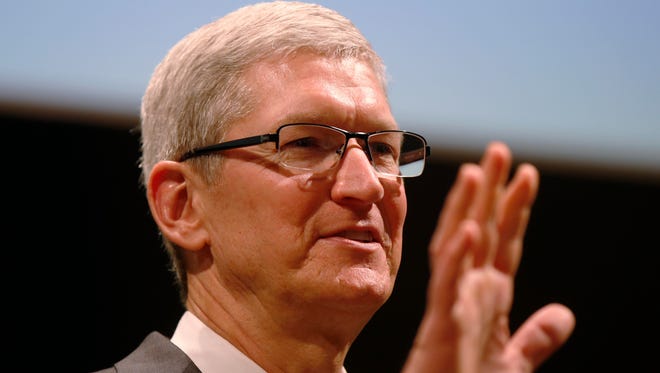Motion asks judge to compel Apple's assistance in unlocking phone
WASHINGTON — Raising the stakes in its battle with Apple, the U.S. government went back to court Friday in an attempt to force the technology giant to comply with a court order earlier this week directing the company to assist the FBI in unlocking the cell phone used by one of the terrorists in December's San Bernardino massacre.

"Rather than assist the effort to fully investigate a deadly terrorist attack by obeying the court's order, Apple has responded by publicly repudiating that order,'' Justice Department lawyers asserted Friday, suggesting that company's refusal amounted to a marketing ploy.
"Apple's current refusal to comply with the court's order, despite the technical feasibility of doing so, instead appears to be based on its concern for its business model and public brand marketing strategy,'' the court documents state.
Following a federal magistrate's order late Wednesday, Apple CEO Tim Cook said the company would fight the decision, saying the government had demanded that the company take "an unprecedented step which threatens the security of our customers.''
"We oppose this order, which has implications far beyond the legal case at hand,'' Cook said. "This moment calls for public discussion, and we want our customers and people around the country to understand what is at stake.''
For the time being, that discussion has been diverted to the courts where Justice officials Friday argued that Apple, through its marketing and design strategy, has sought to "allow technology, rather than the law, to control access to data which as been found by this court to be warranted for an important investigation.''
For more than two months since the attacks that left 14 dead and 22 others wounded, the FBI has been unable to unlock the phone used by one of the shooters, Syed Farook, to determine, in part, whether there is evidence that any others may have been involved in the assault and to learn whether Farook was in communication with victims of the attack.
A federal magistrate earlier this week directed Apple to create software that would bypass some security features on newer versions of the iPhone that would allow investigators to break the password without risking loss of the phone's contents.
Apple could break into its iPhones in an afternoon, say experts
"The government does not seek to deny Apple its right to be heard,'' Justice lawyers said in the new court documents. "However, the urgency of this investigation requires this motion, now that Apple has made its intention not to comply patently clear.''
Apple will have until Feb. 26 to formally respond to the original court order, instead of Feb. 23, as initially requested.
Cook has argued that the government's demand would create a "back door" potentially providing access to all iPhones. "The U.S. government has asked us for something we simply do not have, and something we consider too dangerous to create," Cook said in a statement posted to the company's website.
The battle has once again stoked a simmering debate pitting privacy advocates against national security interests. Several tech companies — including Facebook, Yahoo and Twitter — are siding with Apple, claiming the magistrate's order will lead to weaker security across all consumer tech products. Meanwhile, government and law enforcement officials fear advanced protections make it tougher to prosecute criminal cases.
Federal authorities maintain that the order would apply only to the phone used by Farook, and not a "back door to every iPhone.''
"It does not provide hackers and criminals access to iPhones,'' Justice lawyers argued Friday. "It does not require Apple to hack its own users or de-crypt its own phones; it does not give the government the power to reach into anyone's device without a warrant or court authorization.''
Justice officials said the magistrate's order would allow Apple to "retain custody of its software at all times.''
White House Press Secretary Josh Earnest continued to put forth a nuanced administration position on the case Friday.
“The president does believe that strong encryption is good. It's good for the U.S. economy. It's also good for protecting the civil liberties of private American citizens,” he said. “But at the same time, we don't want to allow terrorists to establish a safe haven in cyberspace.”
He said President Obama has made the San Bernardino investigation a “top priority,” and that the FBI’s attempts to gain access to the cell phone was “consistent with the standard operating practice that the FBI has engaged in for quite some time now.”
Bipartisan leaders of the House Energy and Commerce Committee, meanwhile, announced late Friday that they have asked Cook and FBI Director James Comey to appear before the panel to further air the encryption debate.
In letters to Comey and Cook, Chairman Fred Upton, R-Mich., and senior New Jersey Democrat Frank Pallone, Jr., asked the director and Apple chief to use the forum to make their cases to Congress and the public, indicating that the debate has moved to a "critical juncture.''
Contributing: Gregory Korte and Erin Kelly